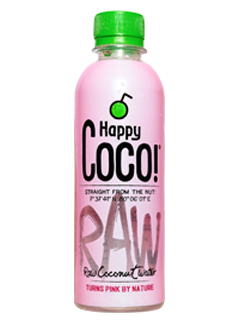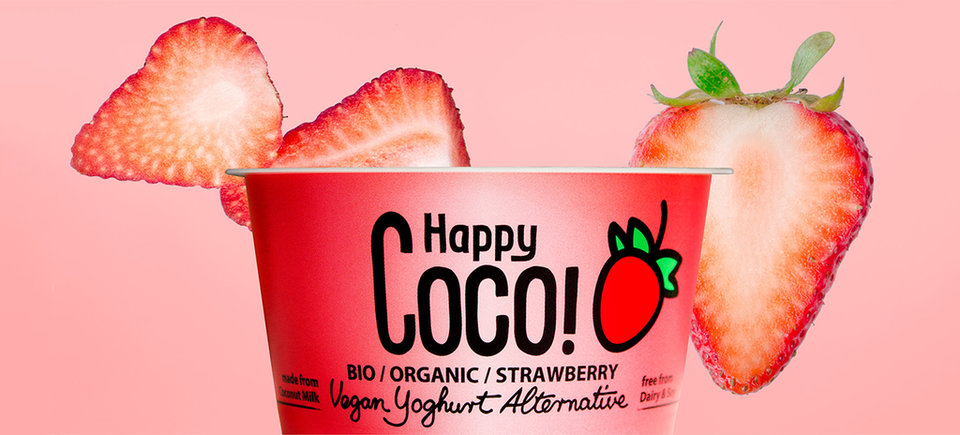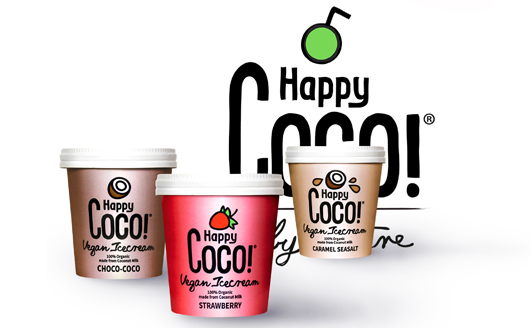sustainability
Sustainability: Compostable Bottles
Sustainability is on the agenda for many different brands. Vegan ice cream and probiotic smoothie brand Happy Coco has taken the next step in its ethical journey by launching compostable bottles made from PLA, which naturally composts and forms no toxic fumes when burned. Katie Woodward talks to co-founder Arjuna van der Kooij to find out more
In April, Amsterdam-based Happy Coco took a leap forward in its sustainability agenda by repackaging its smoothie and coconut water products in compostable bottles. Made from polylactic acid (PLA), the bottles will naturally decompose and produce no toxic fumes when burned, while the caps will be made from a bioplastic material that has a much lower carbon footprint than oil-based plastic.
With plans to repackage its ice cream in Forest Stewardship Council (FSC) certified carton cups and switch from using plastic spoons to wooden ones, Happy Coco aims to make its entire product line compostable and sustainable in the near future. We find out more from co-founder and product developer Arjuna van der Kooij.
Katie Woodward (KW): Please can you tell us a little bit about yourself, the company and its products?
Arjuna van der Kooij (AK): We are a company with a mission to offer healthy and delicious dairy replacement products, based on the coconut miracle fruit. We are coconut experts. It’s a fruit that grows in abundance in tropical regions. The tasty water of the green coconut is isotonic by nature, and is an excellent hydration fluid. The meat can be used to make coconut oil, which is full of beneficial lauric acid and considered to be a ‘healthy’ type of fat. And other products like milk and tasty sugar are also made from it. From the milk we make wonderful tasting yogurt and ice cream. And we bottle the fresh water of the young coconuts without heating it, so the nutrients are not killed.
KW: How important is sustainability to Happy Coco’s ethical agenda?
AK: Organic and sustainable should be the norm, not the exception. We like to be as transparent as possible. Of course, one can ask oneself the question if importing things from far away regions is sustainable. But it’s all about the facts and transparency about them.
Oranges from Spain that travel on road by truck to the UK have a higher carbon footprint than the same oranges shipped from Brazil in a large boat. Scale is an important factor. We also like to reduce our carbon footprint by compensating for it, for example by supporting local forest projects.

Image courtesy of Happy Coco - Raw coconut water
KW: Why has the company decided to switch to using compostable bottles?
AK: Plastic is a big problem for our planet. It creates toxic fumes when burned, and when it ends up in the environment (like the oceans), it pollutes and takes very long to deteriorate. The recycling of plastic is also a far from ideal process, because it takes a lot of energy and there is a mix of many plastics (caps and labels are usually not made from PET [polyethylene terephthalate]), so it is always a process of downcycling at best.
We believe compostable is the best solution. PLA [polylactic acid] material will not compost fast enough in home composts, however over time it will decompose in a landfill, and it doesn’t produce toxic fumes when burned. Also, we feel that the argument [for using] plant materials, which are otherwise used as food stock, does not hold up. Corn and sugar beet, from which PLA is usually made, are not very healthy food crops to begin with, and are usually also fed to livestock to satisfy the very unsustainable human desire for meat.
KW: Can you tell us more about the material used in the bottles? Where is it sourced from? How is it sustainable?
AK: The polylactic acid from which the bottles and labels are made is produced by fermenting the starch from certain crops, in this case sugar beet. It is sourced in Europe, it is non-GMO, and since this is a high yielding crop, pretty sustainable. Since there is a movement towards sugarless foods, using the sugar beet for PLA purposes seems to be a good use to us.

Image courtesy of Happy Coco - Vegan Yogurt
KW: Is your ice cream packaging also widely recyclable?
AK: The packs are made from FSC carton. At the moment the lid and spoon are made from plastic, but we are in the process of changing this to carton and wood this year. It took some time to find the right producer.

Image courtesy of Happy Coco - Vegan Ice cream
KW: Do you think leading food and drink brand names should increase their commitment to sustainable packaging? Why?
AK: Absolutely, but they will not take the lead in this. If something will suppress their profit margin, they will not initiate the change. It is always the little companies, who actually cannot afford it, that are bold (or stupid!) enough to facilitate the change. There is a risk involved, because if the consumer doesn’t want to contribute to the higher price, it will fail.
We like to take the initiative, and then hope the leading brands will follow. But every little step counts. PLA may not be ideal, but the fact that plastic is extremely bad for our planet is hard to deny. Something needs to happen, and we are trying to contribute.
KW: How are you encouraging your customers to recycle Happy Coco packaging?
AK: We believe most European consumers are aware of their own recycling options, but we are working to integrate education material on our website on the repercussions of the different packaging materials. We like to make the consumers (and ourselves) aware of the facts. This is important.
As an example, the Toyota Prius was considered to be a very “clean” electric car, but the material for the batteries created an enormous carbon footprint. So there are many factors involved. Also, our compostable PLA bottles should not be recycled as it doesn’t mix well with plastic, but should instead be thrown away. This is what we communicate on our bottles.
KW: What does the company’s sustainability agenda look like over the next few years?
AK: We’d like to change the cap of the bottles to compostable material as well and are working on a solution here. We also hope to do the same thing with our yoghurt cups, to make them from compostable PLA, hopefully before the end of 2019. Then we will have a fully compostable packaging portfolio.
We believe this is better than recycling, as this takes a lot of energy and in most cases is actually downcycling. Then we would like to make our carbon shipping footprint transparent, and compensate this by facilitating the plantation of trees and the shift towards cleaner forms of energy.